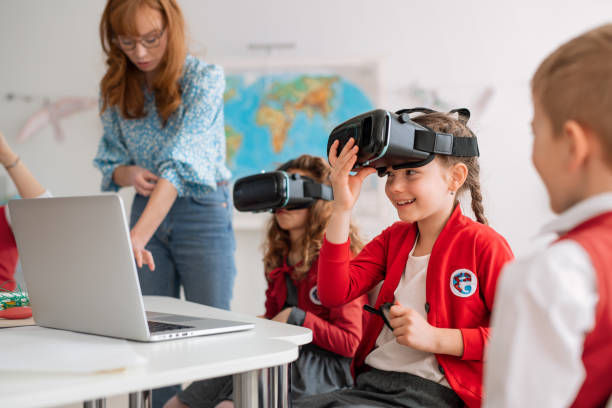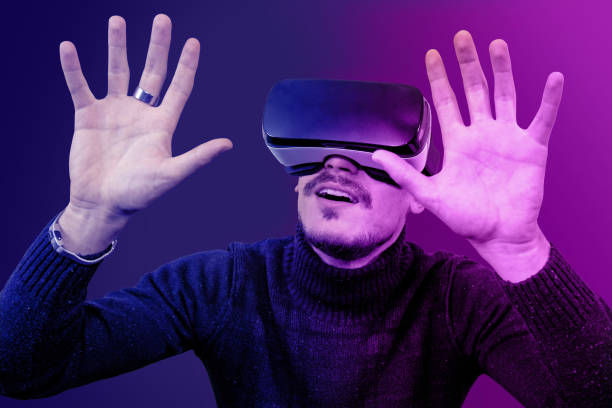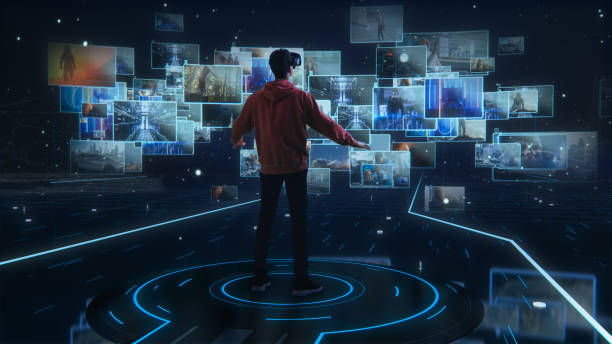The Ethics of Virtual Reality: Navigating the Challenges of an Immersive World.
- The Moolah Team
- Jul 10, 2023
- 9 min read
This post will explore the ethical considerations surrounding VR, including issues of privacy, safety, and the potential impact of immersive technology on society.
I. Introduction: The Rise of Virtual Reality and Its Ethical Implications
Virtual reality (VR) has been around for decades, but recent advancements in technology have made it more accessible and immersive than ever before. With the rise of affordable VR headsets and the increasing popularity of social VR platforms, more and more people are experiencing the wonders of virtual worlds.
However, with this increased usage comes a host of ethical considerations that must be taken into account. From privacy concerns to safety risks to the potential impact of VR on society as a whole, there are many important issues that need to be navigated in this immersive world.
In this blog post, we will explore the ethical implications of virtual reality in depth. We'll begin by examining the privacy concerns surrounding VR, including issues of tracking and data collection, as well as the privacy implications of social VR platforms. Next, we'll look at the safety risks associated with VR, both physical and psychological, and discuss possible solutions to these issues. Finally, we'll consider the impact of VR on society as a whole, including its implications for education and training, entertainment and media, and social interaction and relationships.
Through this exploration of VR's ethical considerations, we hope to shed light on the challenges of navigating this immersive world and encourage developers and users alike to consider these important issues.
So, let's dive in and explore the ethics of virtual reality together.

II. Privacy Concerns in Virtual Reality
As virtual reality becomes increasingly popular, it's important to consider the privacy implications of this immersive technology.
Here are some of the key privacy concerns related to VR:
A. Overview of Privacy Concerns in VR
In VR, everything from head and hand movements to voice and facial expressions can be tracked and recorded. This can lead to concerns about data collection and privacy. Furthermore, VR experiences can be very personal and intimate, leading to concerns about who has access to this information and how it might be used.
B. Tracking and Data Collection in VR
To create an immersive experience, VR devices must track the movements and actions of the user. This tracking can be very detailed, and the data collected can be used to create a profile of the user's behavior and preferences. This raises concerns about who has access to this information and how it might be used. It's important for developers to be transparent about what data they are collecting and how it will be used.
C. Privacy Implications of Social VR Platforms
Social VR platforms, where users can interact with each other in virtual worlds, raise additional privacy concerns. In these environments, users may share personal information or engage in activities that they wouldn't want others to know about. It's important for developers of social VR platforms to implement strong privacy controls and make it clear to users what information is being shared and with whom.
D. Possible Solutions to Privacy Issues in VR
To address privacy concerns in VR, developers can implement measures such as data minimization, where only necessary data is collected and retained, and pseudonymization, where personal data is replaced with a pseudonym to protect the user's identity. It's also important for developers to be transparent about their data collection practices and provide users with clear options for opting out of data collection.
In conclusion, privacy concerns are an important consideration when it comes to virtual reality. As the technology continues to advance, it's crucial for developers to be transparent about their data collection practices and provide users with clear options for controlling their privacy. By doing so, they can help ensure that VR is a safe and enjoyable experience for everyone.

III. Safety Concerns in Virtual Reality
Virtual reality can be a thrilling and immersive experience, but it also raises concerns about user safety.
Here are some of the key safety concerns related to VR:
A. Physical Safety Risks
One of the most obvious safety concerns in VR is the risk of physical injury. When users are fully immersed in a virtual world, they may not be aware of their physical surroundings, leading to accidents such as bumping into objects or tripping over furniture. It's important for users to have a clear and safe physical space to use VR, and for developers to implement safety measures such as warning messages when users approach the boundaries of their play area.
B. Motion Sickness
Another common issue with VR is motion sickness, which occurs when the user's brain perceives motion in the virtual world that doesn't match their physical movements. This can lead to nausea, headaches, and other symptoms. To minimize the risk of motion sickness, developers can design VR experiences with smoother movements and avoid sudden camera changes.
C. Psychological Effects
VR experiences can also have psychological effects on users, such as causing anxiety or triggering traumatic memories. Developers need to consider the potential impact of their content on users and implement warnings or protective measures when necessary. It's also important for users to be aware of the potential psychological effects of VR and to take breaks if they start to feel overwhelmed.
D. Accessibility Concerns
Finally, VR can pose accessibility challenges for users with disabilities or special needs. For example, users with hearing impairments may have difficulty with audio-based instructions, while users with mobility impairments may struggle with physical interactions in VR. Developers need to consider accessibility when designing VR experiences and provide options for users with different needs.
In conclusion, safety concerns are an important consideration when it comes to virtual reality. Developers need to design VR experiences with user safety in mind and implement measures to address issues such as physical safety risks, motion sickness, psychological effects, and accessibility challenges. By doing so, they can help ensure that VR is a safe and inclusive experience for everyone.

IV. The Impact of Virtual Reality on Society
As virtual reality technology continues to advance, it's important to consider its potential impact on society as a whole.
Here are some key areas where VR could have an impact:
A. Social Isolation
One concern about VR is that it could contribute to social isolation, as users become more immersed in virtual worlds and less engaged with the real world around them. While VR can certainly provide new opportunities for social interaction, such as virtual meetups or multiplayer games, developers need to be mindful of the potential for isolation and work to create experiences that balance virtual and real-world engagement.
B. Employment and Training
VR could also have a significant impact on employment and training, as it allows for immersive simulations of job tasks and training scenarios. This could lead to more efficient and effective training for workers, but could also potentially replace certain jobs with VR simulations. It's important for society to consider the ethical implications of these changes and ensure that workers are not unfairly displaced by VR technology.
C. Education
Similarly, VR could transform the way we approach education, providing immersive and engaging learning experiences that go beyond traditional classroom instruction. However, as with employment and training, it's important to consider the ethical implications of these changes and ensure that all students have access to VR education opportunities.
D. Entertainment and Media
VR is already having a significant impact on the entertainment and media industries, providing new opportunities for immersive storytelling and interactive experiences. However, as with any new form of media, it's important to consider the potential impact of VR content on society, particularly in areas such as violence or sexual content.
E. Privacy
Finally, as with any technology that collects data on users, VR raises concerns about privacy. VR experiences can collect a range of data, including user movements, audio and visual recordings, and biometric data. It's important for developers to be transparent about the data they collect and how it will be used, and for society as a whole to consider the privacy implications of VR technology.
In conclusion, virtual reality has the potential to significantly impact society in a range of areas, from social isolation to employment, education, entertainment, and privacy. As this technology continues to advance, it's important for developers and society as a whole to consider the ethical implications of VR and work to create experiences that are safe, inclusive, and beneficial for everyone.

V. The Future of Virtual Reality Ethics
As virtual reality technology continues to evolve, so too will the ethical considerations surrounding it.
Here are some potential future developments in VR ethics:
A. New Forms of VR Technology
As VR technology continues to advance, new forms of immersion and interaction will likely emerge. This could include full-body haptic feedback, brain-computer interfaces, and even fully immersive virtual reality environments. These new technologies will bring new ethical considerations, such as the potential impact on physical and mental health, and the potential for addiction.
B. AI and Virtual Reality
Artificial intelligence is also likely to play an increasingly important role in virtual reality experiences. AI could be used to create more realistic virtual environments, improve the accuracy of simulations, and even personalize experiences for individual users. However, as with any use of AI, it's important to consider the potential for bias and unintended consequences.
C. Virtual Reality and Social Justice
Virtual reality could also have important implications for social justice. For example, VR could be used to create empathy-building experiences that help users understand the experiences of marginalized groups. However, it's important to ensure that these experiences are created in collaboration with the affected communities and do not simply perpetuate harmful stereotypes.
D. Regulatory Frameworks
As with any new technology, virtual reality will likely require regulatory frameworks to ensure that it is used safely and ethically. These frameworks could include privacy regulations, safety standards, and guidelines for the ethical use of VR in areas such as education and employment. It will be important for these frameworks to be developed in collaboration with industry experts, academics, and affected communities.
E. Ethics Education for VR Developers and Users
Finally, as virtual reality continues to grow in popularity, it will be important to educate developers and users on the ethical considerations surrounding this technology. This could include courses on VR ethics for developers, and education on safe and responsible VR use for users. By raising awareness of the ethical implications of VR, we can work towards creating a more ethical and inclusive virtual reality landscape.
In conclusion, the future of virtual reality ethics will be shaped by new technologies, the role of AI, social justice considerations, regulatory frameworks, and ethics education. It's important for society as a whole to stay engaged in these conversations and work towards creating a virtual reality landscape that is safe, inclusive, and beneficial for everyone.

VI. Conclusion: Balancing Innovation with Responsibility in VR Ethics
As we have seen, virtual reality presents a range of ethical considerations, from issues of privacy and safety to the potential impact of immersive technology on society. While virtual reality has the potential to bring many benefits, it's important to approach its development and use with responsibility and care.
One key challenge in navigating the ethics of virtual reality is the need to balance innovation with responsibility. On the one hand, we want to encourage the development of new technologies and experiences that push the boundaries of what is possible in VR. On the other hand, we need to ensure that these developments are pursued in an ethical and responsible manner, with consideration given to the potential impact on users and society as a whole.
To achieve this balance, it will be important for all stakeholders in the VR ecosystem to engage in ongoing conversations about the ethical implications of this technology. This includes VR developers, researchers, policymakers, and end-users. By working together, we can ensure that virtual reality is developed and used in ways that benefit society as a whole, rather than just a select few.
In addition to ongoing conversations, it will also be important to develop and implement guidelines and frameworks that promote ethical VR development and use. This could include industry standards for data privacy and security, regulations around the use of VR in sensitive areas such as healthcare and education, and guidelines for developers to ensure that their products are accessible, inclusive, and free from bias.
Finally, we must not forget the role of education in promoting ethical VR development and use. This includes education for developers on the importance of ethics in their work, as well as education for end-users on safe and responsible VR use. By raising awareness and promoting education, we can ensure that virtual reality is developed and used in ways that are responsible, inclusive, and beneficial for all.
In conclusion, the ethics of virtual reality present a range of challenges and opportunities for society. As we continue to push the boundaries of what is possible in VR, it's important to approach this technology with responsibility and care. By engaging in ongoing conversations, developing guidelines and frameworks, and promoting education, we can ensure that virtual reality is developed and used in ways that benefit everyone.
Thank you for taking the time to read our post on the ethics of virtual reality. We hope that it has provided you with valuable insights into the challenges and opportunities presented by this exciting and rapidly evolving technology. If you enjoyed this post and would like to receive more content like this, please consider subscribing to our newsletter. We appreciate your support and look forward to sharing more insights with you in the future.
Thanks a million,
Moolah.







Comments